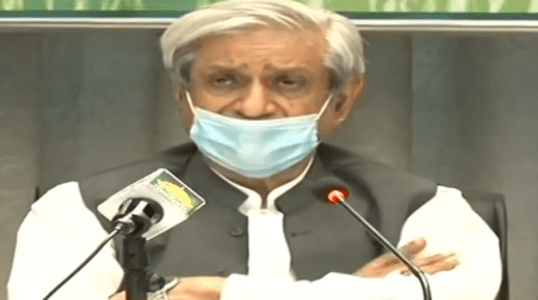ISLAMABAD, Oct 17 (APP):Federal Minister for National Food Security and Research Syed Fakhar Imam has said that the Prime Minister had approved a package of Rs26 billion for erecting a physical infrastructure in the coming years to combat the menace of the pest for the crops.
He said that the government has imported wheat to overcome the shortage of 1.7 million tons and it would arrive in Pakistan by January 2021.
He said this while sharing the views with the participants of webinar titled ” Build Back Better”, organized by the Sustainable Development Policy Institute (SDPI), here on Saturday.
The webinar was held in connection with the World Food Day, said a press release.
Syed Fakhar Imam added that the private sector has also started importing the wheat and it would alleviate the problem further.
The Prime Minister’s five years plan of Rs277 million program and the Covid-19 Rs 50 million fiscal package programs for farmers as subsidy on seeds and fertilizers will also encourage the growers.
The government will encourage and support the small farmers by providing research based timely information regarding seeds and climatic vagaries, he added.
Syed Fakhar Imam said measures would ensure a fair return of their products and improve the quality of living of the people of Pakistan by providing safe and nutritious food to all on fair prices.
Speaking on the occasion, Ms Mina Dowlatchcahi, the country head of FAO, said that the agriculture sector is currently facing two threats that include the threat posed by climate change and the other is pests attack. The recent pandemic, she said, has exposed the fragility of our agriculture.
She added that almost 58% of the world force in agriculture consists of women who are more vulnerable to health diseases.
Therefore, we need to have short to medium- and long-term plans to address this issue. She highlighted the needs of economic inclusion and social protection of the most vulnerable class. Along with food security, she said we also need to work on the equation of the availability of safe food and the utilization of food.
Dr Abid Qaiyum Suleri, Executive Director of SDPI, in his remarks said that the recent inflation is the result of Pakistan’s rupee depreciation as compared to dollar, the gaps in government agricultural and food security policies, and the unavailability of new varieties of seeds compatible to changing environment and pests attacks.
“There is a dire need of supporting the rural economy and the agriculture sector because it not only ensures food security but also provides jobs,” he added.
Dr Suleri said and the importance of having a credible data of the different crops production and consumption. He said that it is inevitable for a policy and evidence-based decisions making.
Ms Rabia Sultan, Director Farmers Association, was of view that we need to have a holistic approach which covers from the production of staples to eatable oil import.
The climate change patterns should be taken very seriously, and the intervention of technology is inevitable to adapt to climate change, the attack of pests and plants diseases like the yellow rust.
Vice Chancellor of the Nawaz Sharif Agriculture University Multan, Dr Muhammad Asif, highlighted the importance of plant base food and the gap between production and nutrition of food in Pakistan. He said that we need to increase our production diversity and nutrition diversity.
Farhan Khan, Country Head of the Italian International Organization (CESVI), informed the participants that his organization is working in mitigating the overall impacts of disasters and emergencies like the Covid-19 on agriculture and food supply.
He said that globally there are millions of people who do not have access to safe and nutritious, hence, it is our collective responsibility to work on ensuring a suitable supply of food to all.
Follow the PNI Facebook page for the latest news and updates.









